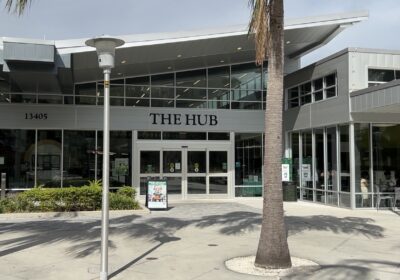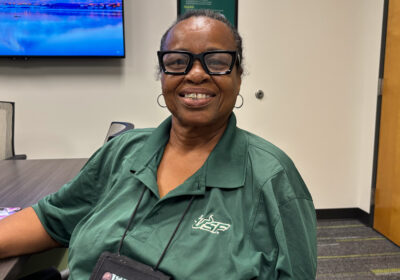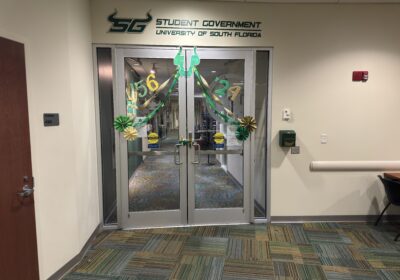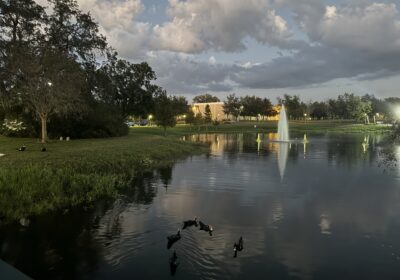The Oracle celebrates 50 years of publication

Fifty years ago today, The Oracle released its first publication and became the primary news source for campus focused headlines. ORACLE PHOTO/JACKIE BENITEZ
Over the past 50 years, The Oracle has borne witness to countless events impacting USF and the country as a whole. Students have covered presidential elections, the move for divestment and even the passing of classmates.
It was the first color newspaper in the country since its inception, as well as the first online publication in Florida beginning in 1995.
Candace Braun Davison, the editor in chief in 2008, recalls how exciting it was to write for a student paper during a major election year. Working until 3:30 a.m., staffers had a map hung on a wall that they marked off as each state’s candidate selection was announced.
They had two mock-ups of the front page completed and were studiously watching the polls to determine if they would have the honor of reporting on a ground breaking election.
“It was incredible to be a part of history,” Davison said. “Seeing students stampede down the street and parade and go crazy over the news … That was one of those moments where you go ‘I can’t believe I’m a journalist. I can’t believe I get to be a part of this experience.’”
However, Davison faced many trying experiences, as well.
During her junior year, USF faced not only the Meningall investigation, in which the vice president of student affairs was accused of mishandling money among other things, but also the tragedy of two former USF and two NFL football players getting lost at sea.
“Students were missing their friends,” said Davison. “These were players they knew and had classes with, and we were trying to help them find answers and deal with the grieving process when one of the students and two of the NFL players died at sea.
“That was a lot of crazy, on-the-ground reporting (and) a lot of learning as you go and trying to be sensitive to all the sources you are talking to.”
This was not the first time Davison had reported on the loss of a student’s life. The semester prior, Alex Solis, a young father and a recently crowned Homecoming Lord, USF Polytechnic’s equivalent of Homecoming King, had died following an injury sustained in a “car-related accident.”
Davison spoke with family and friends and learned first-hand how to balance the need to get the information necessary for the story and “maintain the ethical standard of doing no harm.”
“That was tough because you are trying to interview someone but you’re also surrounded by these really young kids who don’t really understand what’s happening and they keep coming up to you and asking things like, “Where’s my dad? When is he coming home?” and trying to have sensitivity surrounding that,” said Davison.
But sensitive issue weren’t the only ones putting strain on Oracle reporters.
In 1986, when John Hill helmed the paper, the issue taking the country by storm was the push for divestment by universities.
There was a national movement for colleges to divest in businesses that had ties to South Africa, largely due to the apartheid for which the country had become infamous. The protests also put pressure on the South African government to integrate. Hill worked for the better part of a year on a series of articles covering the issue on campus.
“There was enormous pressure everywhere, and that pressure came to USF, as well,” Hill said. “We pushed that heartily both in the news side and editorially. Over time, the university did change its investment strategies to reflect what many thought were to be much more responsible investments.
“It ended up being a very sharp political debate on campus for the better part of at least a year, as I recall, but they did the right thing ultimately and it was an exciting time to cover.”
In 1986, The Oracle was still officially under Student Affairs. Because the paper was not independent, staffers were constantly fighting to balance freedom of press and funding from the university.
“We had a bunch of fights with Student Government,” Hill said. “They tried to control our budget and tried to yank funding from us, and we had to hire an attorney to do a pre-emptive challenge. They backed down and we ended up getting full funding.”
The Oracle officially became independent in 2003 and staff members were given carte blanche to tackle controversial issues, opening the door to more investigative and hard-hitting pieces.
According to Davison, The Oracle prepared her for the real world in a way internships could not.
“I graduated when the recession hit, and I remember doing an interview where they said 1,000 people applied, and I remember thinking ‘How do I have any chance of standing out?’” said Davison.
“What I learned early on was that so many people had zero real-world experience, and in many ways this is a trade. You sharpen your skills by doing it. At The Oracle, day in and day out, you’re writing, you’re editing, you trip up you make a mistake, you learn from it.”
The Oracle has had 79 editors in chief in its 50-year history. A special event will be held in November commemorating their service to the paper and celebrating the countless achievements of The Oracle and its staff.






